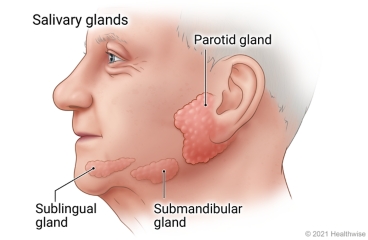Dry Mouth: Care Instructions
Overview

Dry mouth, or xerostomia (say "zee-ruh-STO-mee-uh"), occurs when your mouth doesn't make enough saliva.
Saliva helps you chew, swallow, and digest your food. It also neutralizes the acids that form in your mouth.
Dry mouth can make it hard to swallow or talk. Over time, it can lead to mouth infections, gum disease, and
tooth decay.
Dry mouth is often a side effect of medicines like diuretics, antihistamines, and decongestants. But it has
many possible causes, including cancer treatments and aging.
If medicines are causing dry mouth, your doctor may change the type or dose of the medicine. You may also get
medicine to help you make more saliva.
To avoid the effects of dry mouth, your dentist may apply fluoride to your teeth. This helps prevent tooth
decay. You may also get mouthwash to fight bacteria. You may need more frequent dental checkups.
Follow-up care is a key part of your treatment and safety. Be sure to make and go to all
appointments, and call your doctor if you are having problems. It's also a good idea to know your test results
and keep a list of the medicines you take.
How can you care for yourself at home?
-
Take frequent sips of liquid throughout the day. Water is best.
-
Use ice chips, sugar-free candy, or gum to help keep your mouth moist.
-
Avoid spicy or salty foods. They may cause pain in a dry mouth.
-
Brush your teeth twice a day, morning and night. Floss once a day.
-
Schedule checkups and cleanings as often as your dentist recommends it.
-
Use an over-the-counter saliva substitute.
-
Avoid caffeine, tobacco, and alcohol. They can also make your mouth dry.
-
Be safe with medicines. If you're given medicine for dry mouth, take it exactly as prescribed. Call your
doctor if you think you are having a problem with your medicine.
When should you call for help?
 Watch closely
for changes in your health, and be sure to contact your doctor if:
Watch closely
for changes in your health, and be sure to contact your doctor if:
Current as of: August 6, 2023
Content Version: 14.0
Care instructions adapted under license by your
healthcare professional. If you have questions about a medical condition or this instruction, always ask
your healthcare professional. Healthwise, Incorporated disclaims any warranty or liability for your use of
this information.